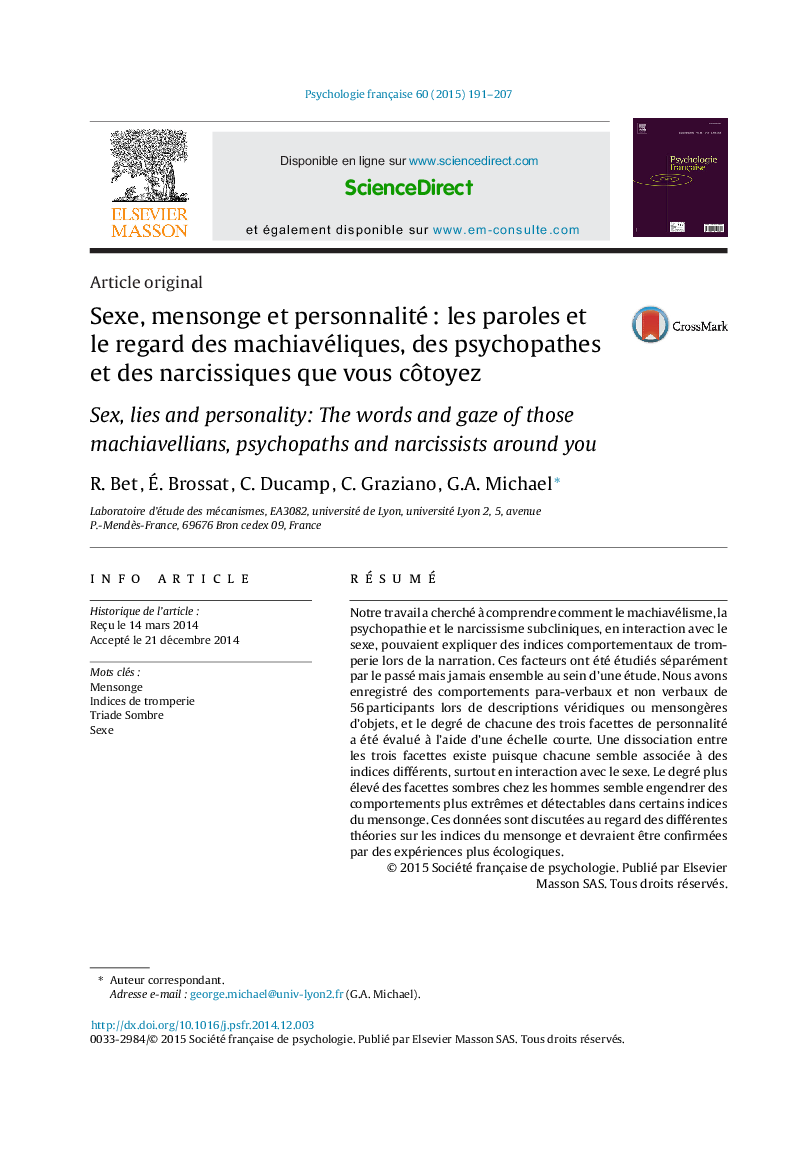| کد مقاله | کد نشریه | سال انتشار | مقاله انگلیسی | نسخه تمام متن |
|---|---|---|---|---|
| 336959 | 547398 | 2015 | 17 صفحه PDF | دانلود رایگان |

RésuméNotre travail a cherché à comprendre comment le machiavélisme, la psychopathie et le narcissisme subcliniques, en interaction avec le sexe, pouvaient expliquer des indices comportementaux de tromperie lors de la narration. Ces facteurs ont été étudiés séparément par le passé mais jamais ensemble au sein d’une étude. Nous avons enregistré des comportements para-verbaux et non verbaux de 56 participants lors de descriptions véridiques ou mensongères d’objets, et le degré de chacune des trois facettes de personnalité a été évalué à l’aide d’une échelle courte. Une dissociation entre les trois facettes existe puisque chacune semble associée à des indices différents, surtout en interaction avec le sexe. Le degré plus élevé des facettes sombres chez les hommes semble engendrer des comportements plus extrêmes et détectables dans certains indices du mensonge. Ces données sont discutées au regard des différentes théories sur les indices du mensonge et devraient être confirmées par des expériences plus écologiques.
Several behavioural cues have been described in the literature as betraying deception. Yet, the conclusions of dozens of studies are unequivocal and even contradicting on whether such cues truly reveal lies. One possible reason is that the effects on these cues of gender and personality were rarely examined simultaneously despite some scarce evidence that such an interaction may reveal more fruitful than when taking gender and personality separately. The current study aimed thus in understanding how gender interacts with some aspects of personality frequently associated with the tendency to deceive, namely the dark triad including machiavellianism, and subclinical psychopathy and narcissism, may account for behavioural cues to deceit during narration. A sample of 56 participants (28 men, 28 women) aged 17–28 years participated in this study. Participant were asked to give a truthful and a deceptive description of objects contained in a box with as much details as possible in answer to several questions given by an experimenter. The interview between the experimenter and each participant was video recorded and behavioural paraverbal and non-verbal cues were taken as dependent variables. Each participant also completed a version of the “Dirty Dozen Scale” allowing to estimate his/her degree of machiavellianism, and subclinical psychopathy and narcissism as to constitute two independent groups on the basis of a median-split (low and high degree of each personality facet). Our study highlights a dissociation among the three facets of personality since each one was associated with different behavioural cues of deception, especially when taken together with gender. The total time of speech, the frequency of eye blinks and the frequency of hesitations during narration were found to be the most sensitive. Globally, men with high degrees of dark facets of personality showed differences in these behaviours between truthful and deceptive descriptions. It is plausible that high degrees of dark facets of personality would result in less subtle behavioural cues in men than in women. Our results are discussed in light of emotional and cognitive factors influencing cues to deception.
Journal: Psychologie Française - Volume 60, Issue 3, September 2015, Pages 191–207